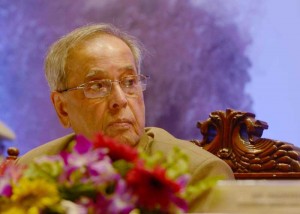
The Indian envoy to Sweden has warned Swedish daily Dagens Nyheter to edit references to the Bofors controversy made by President Pranab Mukherjee in an interview else the presidential visit to Oslo was “at risk of being cancelled”, according to the daily.
But Dagens Nyheter refused to oblige Indian envoy Banashree Bose Harrison and went ahead with publishing the interview.
Mukherjee tells Dagens Nyheter editor in chief Peter Wolodarski in the interview that the Bofors controversy wasn’t a scandal, but rather a “media trial”.
Mukherjee is to visit Sweden on May 31-June 2 in the first ever visit from India “for consolidation of bilateral ties”, said an official statement.
Dagens Nyheter received an official letter from the Indian envoy, in which she conveys the “disappointment” of “authorities in Delhi over the manner in which your interview of the Honourable President has been presented in the Dagens Nyheter of May 24, 2015”.
The envoy complained about the manner in which the Bofors question was represented on its website and said this was “all the more inexplicable since you told me that Bofors is not of interest to your readers”.
The Dagens Nyheter reproduced the ambassador’s complaint on its website.
It also said the envoy called up the paper to make a request to retract “sections of the interview mentioning Bofors” and also warned that the planned presidential visit “was at risk of being cancelled”.
“In a telephone conversation with DN prior to the publication of the article the ambassador made a direct request that DN was to retract sections of the interview mentioning Bofors. She also warned that the planned state visit was at risk of being cancelled,” the paper said.
“I told the ambassador that we couldn’t accept her demands. The president became engaged and was upset when Bofors was mentioned during a question regarding how we can avoid corruption today. Of course we had to tell our readers about his reaction,” Wolodarski is quoted as saying.
“The reactions in Indian media show that his answers are of public interest, even more so in India than in Sweden.”
“At the end of the interview, DN light heartedly mentioned the fact that the president mixed up Sweden and Switzerland several times. This was unprofessional and unethical by the newspaper,” according to the ambassador.
She also claimed that DN, by shortening a video interview from six minutes to three, misled the audience.
“I find the ambassador’s reaction regretful. It is surprising that someone representing the world’s largest democracies is trying to micromanage which questions we should ask a head of state, and which answers should be published,” Wolodarski is quoted as saying.
“DN published four pages in our Sunday edition, containing almost every answer from the Indian president. We have conducted the interview in the same manner as we do whenever we interview other heads of state and government,” it said.
The Bofors scandal, which rocked India in the 1980s, was over allegations that the Swedish arms manufacturer Bofors AB paid $640 million as kickbacks to secure a $1.3 billion contract to sell 155 mm field howitzers to the Indian Army.
According to Wolodarski, “I didn’t plan on taking up the old armaments corruption scandals, but rather on asking a question about how new Bofors affairs with the accompanying corruption can be avoided, especially if trade between Sweden and India is to increase.”
“At this point, President Mukherjee becomes animated.
“First of all, it is yet to be to be established that there was a scandal. No Indian court has established it, he reminds us.”
“I was the defence minister of the country long after Bofors, and all my generals certified that this is one of the best guns we are having. Till today, Indian army is using it.
“The so-called scandal which you talk of, yes, in the media, it was there. There was a media trial. But I’m afraid, let us not be too much carried by publicity.
“So it was a media scandal?
“I do not know. I’m not describing it, you’re putting that word. Don’t put that word. What I am saying is that in media it was publicised. But up to now, no Indian court has given any decisive verdict about the alleged scandal,” it quoted Mukherjee as saying.
Wolodarski said that after 30 minutes, President Pranab Mukherjee concluded the interview, “but insists on making a clarification before he stands up to briefly guide us through the paintings in the presidential building’s State Corridor”.
“One thing I must correct… two, three times during the interview, I have used the word Swiss. I of course meant Swedish,” the daily quoted Mukherjee as saying.